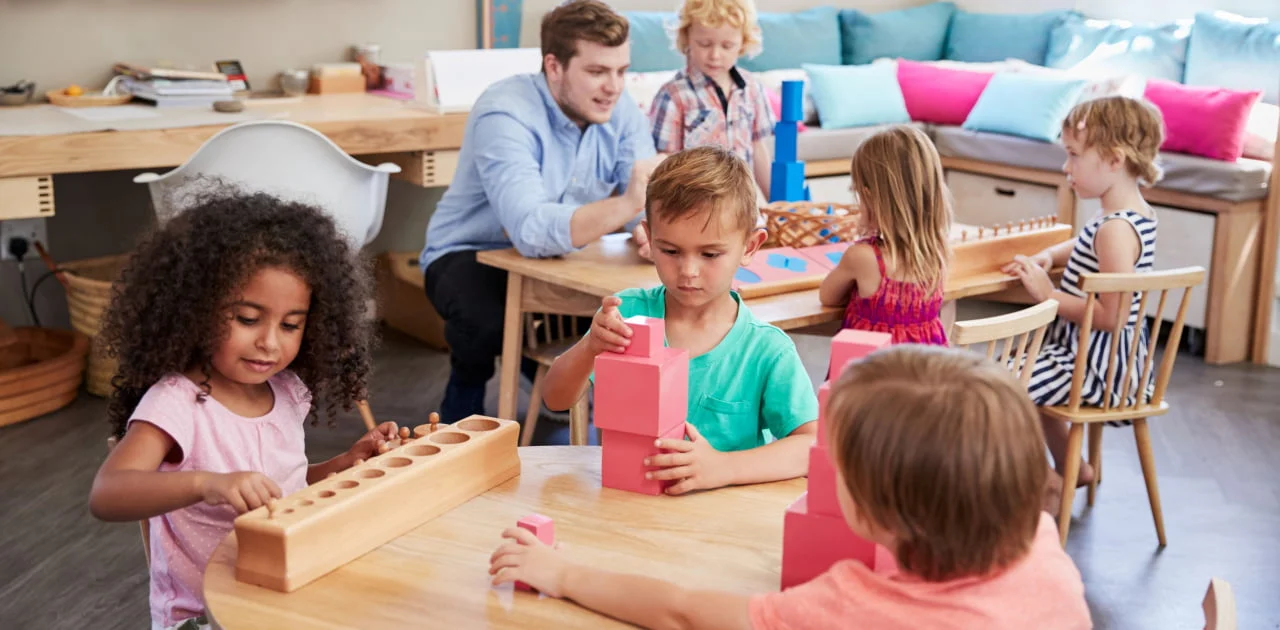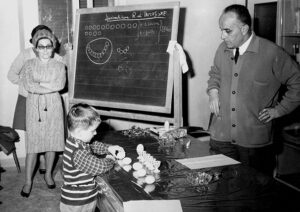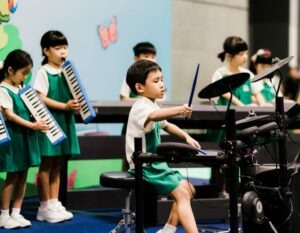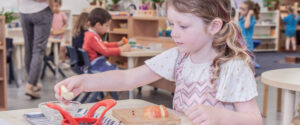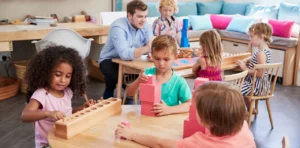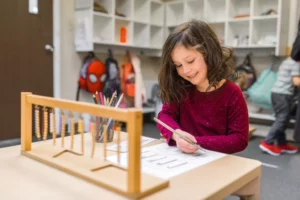The Core Philosophy
The bedrock of the Montessori approach lies in its respect for the child. Recognizing the inherent potential within every learner, Montessori techniques create an environment where children can freely explore, make choices, and discover at their own pace.
Key Montessori Principles
-
Prepared Environment: The Montessori method emphasizes the importance of a carefully constructed learning environment. This “prepared environment” is designed to encourage hands-on learning, independent thinking, and self-correction. Every aspect of this space is intentionally selected to meet the developmental needs of the children and facilitate their self-directed exploration
-
Role of the Educator: More a guide than a traditional teacher, the Montessori educator observes, supports, and facilitates rather than instructs, letting the child take the reins of their educational journey. In traditional pedagogical models, the teacher often assumes the role of the central figure, imparting knowledge and directing classroom activities. However, in Montessori education, the educator’s role undergoes a significant transformation. Rather than being the primary source of knowledge, the Montessori educator serves as a guide, facilitator, and observer, working in tandem with the child’s inherent curiosity and drive to learn.
-
Emphasis on Self-directed Learning: Children are given the freedom to choose their own activities, which encourages them to feel a sense of ownership and motivation from within. Although it was originally designed for young children, the Montessori method has proven to be adaptable and has been applied to various age groups. While teachers are usually seen as the main source of knowledge and the central figure in the classroom, their role undergoes a significant transformation in Montessori education. Instead of being the primary source of knowledge, Montessori teachers serve as guides, facilitators, and observers who work alongside the natural curiosity and drive to learn that children possess.
Montessori Across Ages
While initially crafted for early childhood, the Montessori method’s adaptability has seen its principles applied across various age groups. The beauty of the Montessori philosophy is its adaptability across various age groups. It is not limited to early childhood but offers a framework for holistic development from infancy to adulthood. This comprehensive approach nurtures the evolving needs and capabilities of the individual at each life stage.
- Infants and Toddlers: The main aim is to promote the development of motor skills and sensory exploration in a secure environment for the youngest Montessori students. The focus is on creating a nurturing and safe space that honors the child’s growing independence.
- Preschool and Kindergarten: In order to promote the development of crucial skills such as language, mathematics, and socio-emotional abilities, children are provided with a variety of structured activities. These activities are designed to encourage independence, exploration, and the discovery of new concepts. By participating in these activities, children are able to not only enhance their cognitive abilities but also develop important social skills that will serve them well throughout their lives.
- Elementary and Beyond: The educational approach focuses on fostering collaborative projects, research, and critical thinking, all of which are grounded in the principles of self-direction that were established by Montessori. This curriculum is designed to facilitate the development of children’s intellectual curiosity and abstract thinking abilities, enabling them to explore the world around them with a sense of wonder and purpose. Through this approach, students are empowered to take ownership of their learning and develop a lifelong love of discovery and exploration.
Montessori in the Modern Age
As technological advancements redefine educational landscapes, the Montessori approach adeptly embraces these innovations while upholding its core tenets. Contemporary Montessori environments utilize interactive applications, state-of-the-art platforms, and a plethora of online resources to augment the Montessori pedagogy, ensuring its pertinence to today’s digital-native learners. While the Montessori ethos traditionally prioritizes tactile, hands-on exploration, the modern adaptations of this method thoughtfully weave in technology to bolster and enrich the curriculum. Amidst this digital immersion, Montessori institutions recognize the imperative of instilling in students the principles of responsible online conduct. Comprehensive lessons on digital etiquette, ethical online engagement, and cybersecurity are increasingly integrated. Furthermore, in tune with global sustainability movements, contemporary Montessori schools embed practices like organic gardening, composting, and other eco-conscious activities, nurturing a profound appreciation for nature. As we navigate an era where automation and artificial intelligence revolutionize the job landscape, the emphasis Montessori places on skills such as critical thinking, teamwork, and emotional intelligence becomes ever more indispensable.
Expanding Horizons: Montessori Beyond Academia
The Montessori approach extends far beyond mere academic pursuits, establishing a foundation for comprehensive personal growth that encompasses emotional, social, physical, and cognitive dimensions. This method intentionally cultivates skills such as resilience, adaptability, and empathy, positioning students to navigate real-world complexities with grace. Within Montessori environments, children are seamlessly introduced to practical life activities, including cooking, cleaning, and gardening. Such engagements not only foster a sense of independence and responsibility but also offer a tangible understanding of everyday processes. Central to Montessori pedagogy is an intrinsic connection with the natural world, emphasizing the importance of outdoor exploration and hands-on nature activities. This ethos is further augmented by the proactive stance many Montessori institutions adopt toward environmental stewardship. By embedding eco-conscious practices within their curricula, these schools impart the crucial principles of conservation and sustainability to the next generation
Conclusion: The Timelessness of Montessori
Over a century after its establishment, the Montessori method’s sustained relevance underscores its robustness and versatility. As we traverse the dynamic terrains of modern education, Montessori’s principles emerge as a guiding light, championing a holistic, student-centric approach that genuinely resonates with every learner. The continued allure and efficacy of the Montessori philosophy are anchored in its foundational tenets, which seamlessly align with the innate pathways of human development. While instructional mediums and methodologies may undergo transformations, the core Montessori ethos — which champions independence, nurtures curiosity, and instills respect — remains as salient today as it was at its genesis. This enduring relevance is a compelling tribute to Dr. Maria Montessori’s visionary approach to education, which continues to challenge conventional pedagogical norms, even in the contemporary era.

